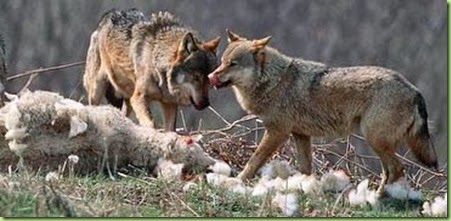Wisconsin opened its first wolf hunt in seven years on February 22, after a Jefferson County Judge denied a request by the state’s Department of Natural Resources to delay the hunt.
Management of gray wolves devolved to states with wolf populations after the Trump administration removed them from the list of endangered species under 1973 Endangered Species Act (ESA) in October 2020.
In the lower 48 states, gray wolves had been listed as endangered or threatened for more than 45 years, giving them federal protection. The U.S. Department of Interior (DOI) estimates more than 6,000 wolves currently exist in continental United States, far exceeding DOI’s recovery goals. DOI determined states have developed expertise and produced management plans sufficient to ensure wolf populations do not decline to the extent that they need federal protection in the future. Wisconsin and some other states’ wolf management plans allow sport hunting to manage wolf population size.
Dispute Over Hunting Season
Existing Wisconsin law required the state DNR open a wolf hunt from early November to late February upon the return of wolves to state management. The DNR planned to start the season in November 2021, however, Hunter Nation, a hunting advocacy group sued to open the season sooner, arguing under state law a hunt should be held this winter. Wisconsin’s Court of Appeals agreed and a Jefferson County judge allowed season to start on February 22 running until February 28, or whenever harvest quotas are hit.
“State law is very clear,” Luke Hilgemann, CEO of Hunter Nation, told WMJ4 in Milwaukee “Once the wolf is removed from federal protection, we have the ability to move forward and it says shall in the law, not may, shall have a hunt in Wisconsin from the months of November to February.
“This is a historic victory for hunters in Wisconsin!” Hilgemann added on Twitter after the court ruling.
Population Control
Growing wolf populations pose a threat to livestock and pets and must be managed says Hilgemann, and hunting is the appropriate way to do so.
“We need to have a responsible management system, we believe that hunters play a responsible and important role in that management, and we look forward to getting out there and hunting these animals just like we do with many others very soon,” Hilgemann said.
WMJ4 also interviewed Ryan Klussendorf, a dairy farmer in Medford Wisconsin, who also approved of the hunt, reporting wolves have killed his cows in the past, saying they have become a threat to public safety.
“It does close to home for us,” said Klussendorf. “We’ve had a depredation in the past. They chase our cattle out on the highways.”
Klussendorf made clear, for him, allowing the hunt is about population control, not eliminating wolves.
“Myself and I know other farmers as well, we don’t want to see wolves eradicated,” Klussendorf said. “We want to see them be able to be managed and put boundaries back into place because they’re not showing fear anymore.”
Quota Set, Early Hunt Closures
Wisconsin’s DNR estimates there are than 1,100 wolves in the state, significantly higher than the 350 target population set in the state’s management plan.
For the initial weeklong season, DNR set a quota of 200 wolves for the entire state, divided into six zones.
After native tribes, particularly bands of the Objiwe, elected to reserve their allotted portion of the wolf quota on territories under their control, 119 wolves remained for resident hunters to take.
More than 20,000 Wisconsinites applied for the 2,380 wolf hunting and trapping tags DNR awarded by drawing on February 21. Those receiving tags were required to purchase a $49 license on top of the $10 they paid to apply for the drawing. DNR says the revenue generated by the wolf hunt is will be used to pay for wolf damages, for example, livestock depredations.
By February 23, after just two full days of hunting, hunters had harvest 52 wolves statewide. By February 24, the DNR had already closed hunting in three central and southern zones of the state, where hunters had already harvested more than half the quota allotted in those zones.
H. Sterling Burnett, Ph.D. (hsburnett@heartland.org) is the managing editor of Environment & Climate News.


























